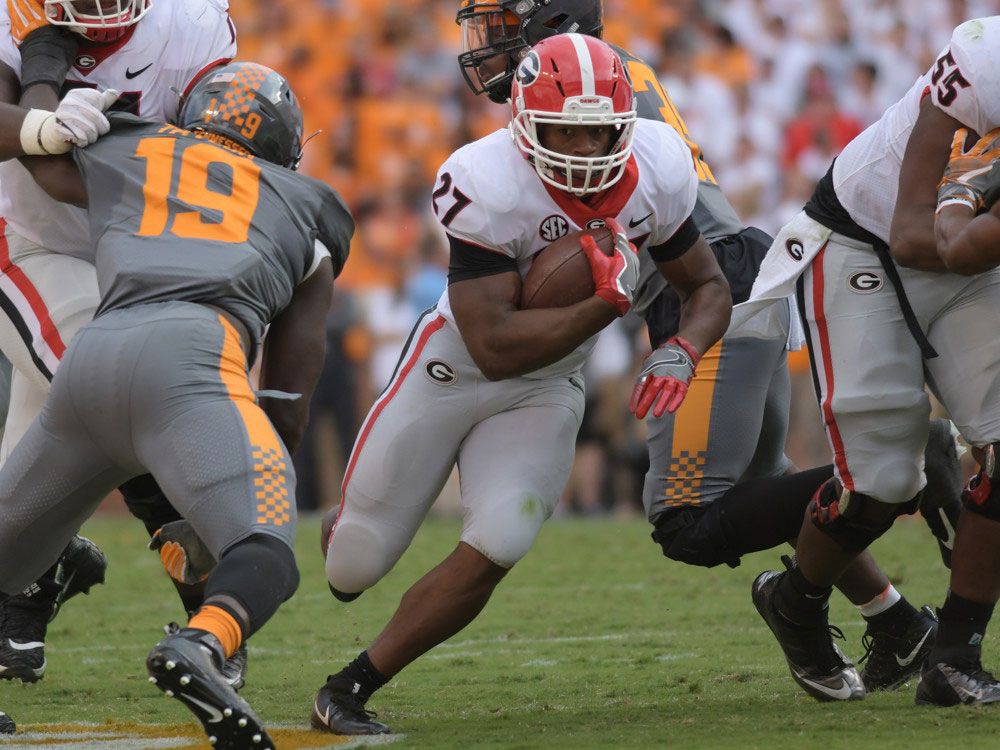Fifteen years ago, it was easy to talk yourself into the Vols taking over the SEC East. Tennessee won the division in 2001, beating Steve Spurrier on his way to the NFL. A heartbreaking loss in Atlanta only fueled expectations for 2002, with the Vols ranked fifth in the preseason AP poll. It’s hard to believe now, but the SEC East was at the peak of its powers: the Gators were sixth, the Dawgs eighth in the initial poll. Even South Carolina snuck in at #22. Only Nick Saban’s LSU squad was ranked (#14) from the SEC West.
And yet, it’s hard for me to remember more preseason optimism in Knoxville. Riding high on the program’s success from 1995-2001, dominance was the next step and Spurrier was out of the way. Mark Richt and Georgia had upset the Vols the year before, but that loss ultimately didn’t cost Tennessee; it was still easy enough to fall back on UT’s 90’s dominance over the Dawgs. Winning in Gainesville chased away the final monkeys on Phillip Fulmer’s back, and no one believed Ron Zook would wrangle them back in place. When his Gators were blown out by Miami before coming to Knoxville, Tennessee smelled blood. 2002 was my last year in the student section and we were thinking blowout, a dream rarely available to Vol fans in this rivalry.
Instead, one of the strangest nightmares I’ve ever seen in Neyland: an absolute downpour led to five Tennessee fumbles in the last five minutes of the first half, turning a scoreless slugfest into a 24-0 Gator lead. The Vols fell 30-13, then lost 18-13 in Athens with Casey Clausen out due to injury.
While Tennessee stumbled to an 8-5 season, Georgia pounced. The Dawgs lost to Florida as well, but it would be their only blemish in a 13-1 SEC Championship campaign, Georgia’s first since 1982. It was also the first time someone other than Tennessee or Florida won the SEC East, setting the stage for a time of parity: a three-way tie in 2003, the Vols back on top in 2004, and Georgia back in Atlanta in 2005.
By 2006 Urban Meyer had Florida back to being Florida, and the window got a lot smaller for both Tennessee and Georgia. In the last 10 years the Vols have been to Atlanta once (2007), and Georgia only twice: merely an appetizer for LSU in 2011, then the nearest of misses against Alabama in 2012. While the Vols walked in the wilderness with three different coaches, Richt’s Georgia programs saw teams outside the Top 10 slide past them to Atlanta in 2010, 2014, and 2015.
Historically, this is Florida’s division: a dozen titles in 25 years, while Tennessee and Georgia had just five each coming into this season. As such, the Vols and Dawgs must take full advantage when the Gators aren’t at full strength. It took the best of Tennessee’s best to win three titles in five years at the end of Spurrier’s tenure. Georgia never won the division when the OBC was in Gainesville, and only went to Atlanta in Urban Meyer’s first year on those same sidelines.
When Florida was in transition 15 years ago, Mark Richt kept Tennessee from taking over. When the Gators started slipping again at the end of Will Muschamp’s tenure, another golden opportunity presented itself. But this time, Tennessee kept Tennessee from taking over. The Vols should be riding a four game winning streak over Florida and two straight SEC East titles. Instead, Tennessee got just one win over the Gators, failed to capitalize on two others over Georgia, and still hasn’t seen the SEC Championship Game since 2007.
The good news: Florida is still vulnerable. The bad news: Georgia called dibs.
Kirby Smart’s team is detonating the argument for the SEC being a mass of 8-4 behind Alabama. The Dawgs are 9-0 and yet to be threatened in the SEC. They buried what appears to be a good Mississippi State team 31-3 and, most importantly, beat Tennessee and Florida by a combined 83-7. They will graduate Nick Chubb, Sony Michel, and a good chunk of their starting defense. But they currently boast the nation’s fifth-best recruiting class, including 11 four-or-five-star commits for a blue chip ratio of 61%. Once-solid recruiting classes from the Vols and Gators are up in the air as their coaching situations resolve themselves.
Florida is down, but they tend not to stay there forever. Butch Jones missed his chance to take advantage in 2015 and 2016. Now all signs point to the Vols making a change at the end of 2017, embracing the speed bumps of transition in hopes of greater progress down the road. But Georgia is firmly in the driver’s seat, both in the division and, right now, in all of college football atop the playoff poll. It’s a small sample size for Kirby Smart, but an impeccable one in year two. If/when the Vols make a change, they should have the opportunity to make a better hire than in January 2010 or December 2012. But with Georgia dominating and the Gators looking to level up at the same time, it’s also a dangerous time for Tennessee. The opportunity to get it right is greater, but so too are the risks if the Vols get it wrong.

